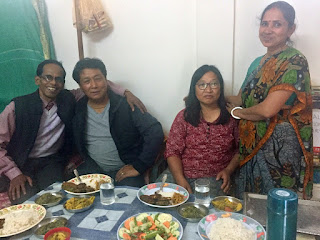 |
| picture source: google |
The Indian elections are
finally over and as the closest neighbor and friend; many Bhutanese may have
followed it with interest. For Bhutanese though, elections in India is seen as
a massive exercise that, irrespective of which party comes to the power, the time tested
friendship between the governments, leaders and people of the two countries will
remain unaffected and continue to grow stronger between the two closest
neighbors.
Conducting elections in India especially the
parliamentary election in the world’s largest democracy with a population of
over one billion people and with almost 900 million eligible voters is by no
means a mean feat for the election commission of India. Despite coming under severe criticism over
several election issues and allegations of its inaction, the commission seems
to have done a great job.
The seven phase elections of
2019 in India returned Prime Minister Narenda Modi and NDA with an
unprecedented 336 seats in the 545 seats. India’s grand old party the Congress
led by Rahul Gandhi won just a
disappointing 52 seats and has since then asked the Congress Working Committee
(CWC) to find a new leader for the party by putting in his resignation and taking
solid blame of the party’s debacle upon himself.
From the debates that continue
to take place on mainstream media in India analyzing the just concluded
elections, one thing is clear that, electorate this time had no alternative to Mr
Modi and that the elections was fought not on issues but on personality and nationalism. But, one thing is
clear, Narendra Modi led BJP and NDA decimated its opponents and pushed the
rest to the fringes. Not even regional parties and alliances which were
traditionally strong in their turf failed to resist the so called Modi wave in this
election.
Some political analysts say that the Congress
party must die a natural death for new talents to come up and yet they see
Congress as the only national party that can and must rebuild and reinvent
itself as an alternative. And for Congress to survive without splintering, the
experts feel that it must continue to have someone from the most powerful
political family in India, the Nehru-Gandhi family.
Watching the electoral process
unfold in the world’s largest democracy, it gives us an opportunity to understand
the process better. One thing is certain, our constitution drafting committee
has done a stellar job and we have a better electoral law than even the world’s
largest democracy in ensuring free and fair elections by taking care of at
least three crucial factors that may affect elections.
First and perhaps the most
important element in any elections is the need for a level playing field. This
cannot happen if a party and its candidates fight elections with powers still
vested with them. In India, the Prime Minister and his cabinet fights the
general elections without having to resign which may lead to misuse of
officialdom to the incumbent’s electoral advantage. Our election law not only
requires the government to resign and institute an interim government to
oversee the elections but forbids anything that creates even the slightest
visible inequalities between the candidates.
Secondly, there seems to be no
restriction on the use of media like in our case where all parties and
candidates are entitled to specific and equal media coverage with even the use
of social media strictly monitored. In India, even the mainstream media are
found to be giving excessive coverage to a party or an individual who makes more
news with the rest having a limited coverage.
The third and the equally
important element is the participation of religious personalities in the
elections as candidates or as patrons. In a deeply religious society, a
religious figure may have a mass following and what will happen if they are
allowed to contest as candidates. In our society we deeply revere and respect religion
and religious figure. They are always someone who are above the realms of
ordinary life and therefore are rightly considered above politics allowing
elections to be fought among the ordinary beings. Some members with religious
tags are elected to the parliament for the fifth consecutive terms in India
despite their dismal performance.
The recently concluded general
elections in India were for the 17th Lok Sabha while we just
concluded our third general elections last year. Ours is the youngest democracy
in the world but, we certainly have the best electoral laws to ensure level
playing field which bigger and older democracies around the world can learn
from for a free and fair elections.
Gyembo Namgyal
Pemagatsel
May 27, 2019




